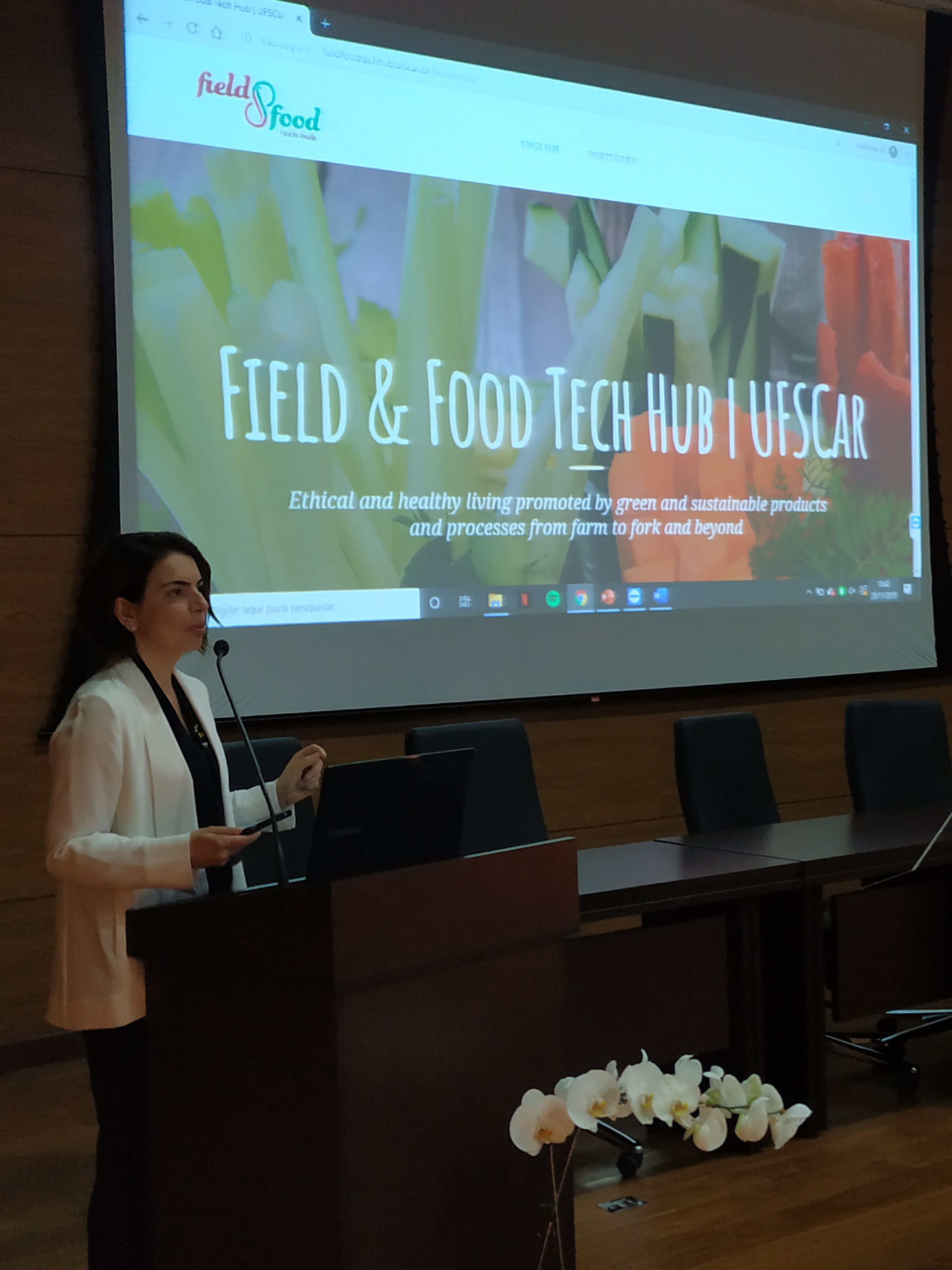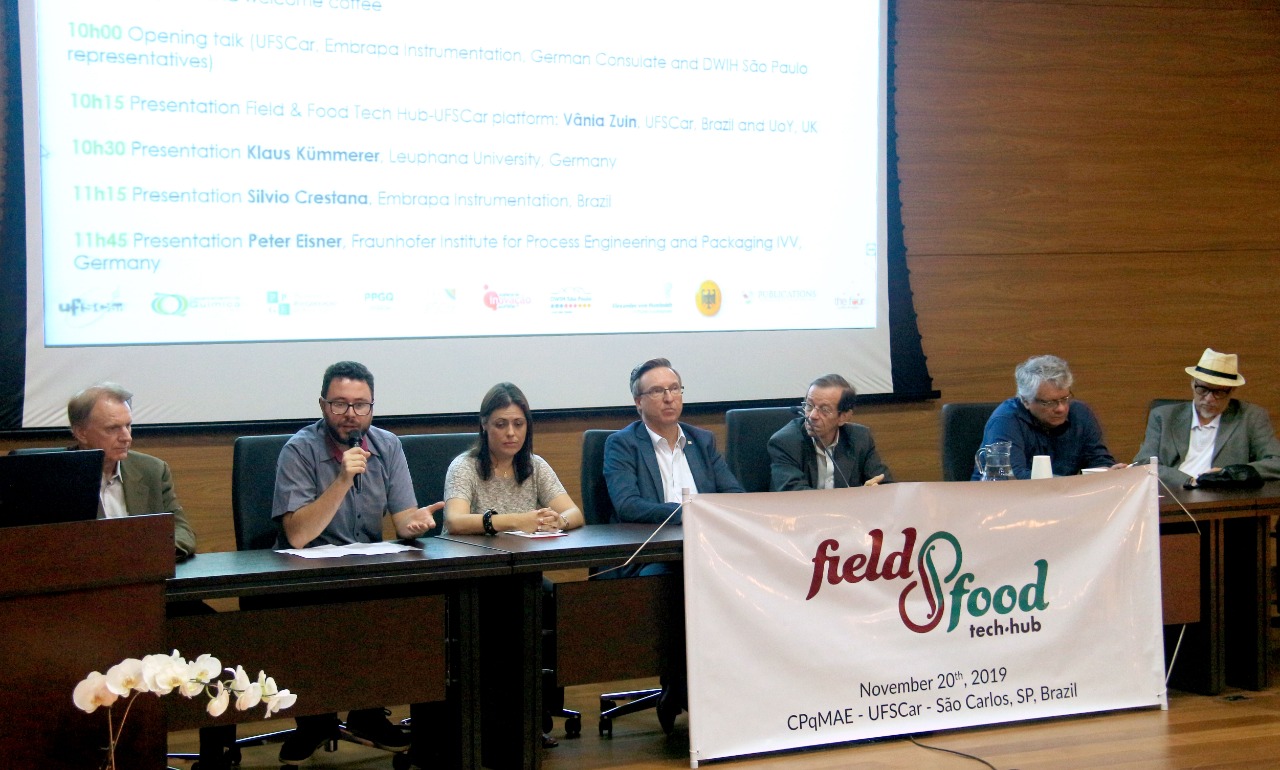DFG Attends Events Pertaining to Foundation of Field & Food Tech Hub in São Carlos
Funding opportunities for German-Brazilian research cooperation
(20.12.19) Researching new food production methods is becoming increasingly important for researchers in Germany and abroad. In the years to come, there will inevitably be an increased demand for food due to the anticipated population growth, which means that we will have to rethink not only the way we produce food but our forms of food consumption as well.
The Field & Food Tech Hub-UFSCar opened on 20 November at the Research Centre for Modern Materials and Energy (CPqMAE) of the Federal University of São Carlos. It aims to address these issues on a large scale. Key German and Brazilian institutions, which either provide funding or assistance in the field of environmentally-friendly technologies in their different forms, attended the opening event and the information event that followed. The event’s speaker programme included contributions from the DFG’s Latin America office, the Federal University of São Carlos (UFSCAR), the Brazilian Research Institute for Agriculture (EMBRAPA), the German Consulate, the DWIH and its supporters, Leuphana University and the Fraunhofer Institute for Process Engineering and Packaging (IVV).

Prof. Dr. Vânia Zuin presents the new Field & Food Tech Hub
© UFSCAR
The new centre of excellence is primarily engaged in the development of environmentally-friendly and sustainable technologies that aim to prevent waste generation in all stages of a production chain. Work projects, strategies, guidelines, business models and practices, which represent the concept of environmentally-friendly and sustainable scientific technology in agroindustrial sectors, food research and related branches, were presented during a number of different scientific talks. Those involved included consolidated research networks that are not confined to technical disciplines, such as chemistry, engineering, IT and medicine, but rather incorporate the humanities. The Deputy Director of Fraunhofer-IVV, Peter Eisner, outlined the Acrowards project which is engaged in the development of sustainable cultivation systems for macaúba palms and the identification of suitable procedures for processing the exquisite fruits for food and non-food use.
The new centre of excellence Field & Food Tech Hub sets out to assist in the search for relevant sources of information, as well as partnerships and support. It aims to bring together initiatives by research institutions in São Carlos, which are concerned with biomass or water from agroindustrial chains, factoring in design, production, distribution, use and treatment. Its focus is on the health of humans and the environment in consideration of the United Nations' Sustainable Development Goals. Cooperation between companies, research and technology institutes, venture capital firms, entrepreneurs as well as the support of strategic policy initiatives in this field is vital for the development of world-class agricultural and nutrition solutions.

Speakers at the opening event of the Field & Food Tech Hub
© UFSCAR
In the course of her presentation, Dr. Kathrin Winkler, Director of the DFG’s Latin America office, also presented the German-Brazilian initiative for the funding of research cooperations, Programa Iniciativa de Pesquisa Colaborativa (PIPC). This is a programme that will be implemented in partnership with the Brazilian funding agency for higher education, CAPES. Its objective is to step up bilateral cooperation in research and to fund joint research projects in certain fields that are of scientific importance and have potential for cooperation, such as chemistry. In the medium and long term, this is expected to result in cooperation between the different bilateral projects to facilitate the development of broadened research networks.
These measures are expected to promote scientific excellence and the internationalisation of the German and Brazilian scientific community, enhance the exchange between researchers with a doctoral degree, postdoctoral researchers and senior academics, and thus create added scientific value beyond that which can be achieved at the national level. Further calls for proposals have been planned for 2020 and beyond in the field of chemistry and innovative production techniques, such as Industry 4.0 and digitalisation. Information on the cooperation between the DFG and CAPES is available here.
For more information on the new Food Tech Hub, visit: